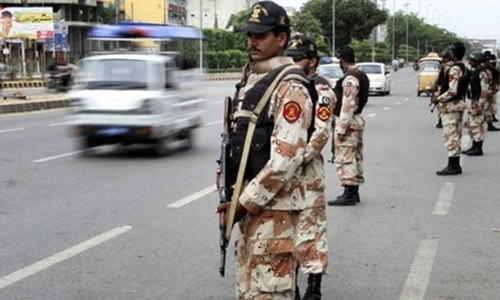KARACHI: The provincial government is considering adopting a “Punjab model” for granting special powers to the Rangers after which the paramilitary force will only “assist” the police in action against terrorists and criminals, it emerged on Sunday.
Two senior government officials familiar with the development told Dawn that the Sindh government was not willing to extend the Rangers’ special policing powers that ended on April 15.
“The provincial government is seriously considering not granting special policing powers to the Rangers,” said one of the senior officials on the condition of anonymity. “Instead, the government wants their [Rangers] role only for providing assistance to the police in carrying out actions against the criminals like the paramilitary force has been given in Punjab.”
On Feb 22, the federal government had approved a Punjab government request for the deployment of Rangers in the province, where the Rangers are “assisting” the Punjab police and law enforcement agencies in their fight against terrorism for 60 days.
The officials said that the powers the Rangers were enjoying in Sindh were different from what they had in Punjab.
They said that in Sindh the Rangers had a lead policing role and they can carry out raids, arrest suspects, interrogate them and conduct snap checking on their own. The Rangers also wanted their own police stations to be set up in Karachi, engaged their own counsel to represent them in trial courts.
But in the “Punjab model”, they said, the role of the paramilitary force was only restricted to carrying out raids and providing assistance to the police.
The Sindh government had accused the Rangers of overstepping their mandate. It remained at the loggerhead with the paramilitary force when the latter raided certain government offices in 2015 and took away record in a bid to find evidence of corruption.
It also expressed “some reservations” when the Rangers raided offices of a businessman in Karachi the day former president Asif Zardari returned to the country after ending his 18-month-long self-exile in December 2016.
While the Rangers had wanted policing powers for whole Sindh, the provincial government had been giving them special powers only for Karachi division.
“Such steps [taken by the Rangers] put the Sindh government in an awkward position,” said an official.
However, the officials said that it was not likely that the current issue was related to the mysterious disappearance of two close aides of Mr Zardari in Karachi and Hyderabad.
But Zardari himself told a television channel on Sunday that “someone else, and not the police, was picking up his friends”.
The issue of Rangers policing powers has been causing a war of words between the federal and the Sindh governments.
Only on Saturday, Interior Minister Chaudhry Nisar Ali Khan said that the interior ministry was in touch with the Sindh government with regard to the issue of Rangers’ special powers.
In January, the Sindh government had extended the special powers of the Rangers in Karachi for 90 days.
A couple of days ago, the Sindh home department had sent a summary to Chief Minister Murad Ali Shah to extend the Rangers’ powers for another 90 days under the Anti-Terrorism Act of 1997.
On Sunday, a spokesman for the Chief Minister House told Dawn that the provincial chief executive was “examining” the summary and a decision to that effect would be taken in accordance with the law.
Published in Dawn, April 17th, 2017











































